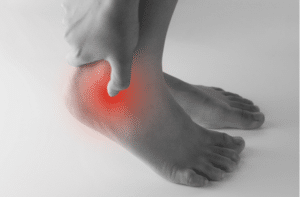 Achilles tendonitis, a mild ache in the back of your lower leg punctuated with shooting pains after physical activity, is an overuse injury caused by stressing your achilles tendon.
Achilles tendonitis, a mild ache in the back of your lower leg punctuated with shooting pains after physical activity, is an overuse injury caused by stressing your achilles tendon.
The people most likely to experience this overuse injury are also the most likely to want to push forward despite the injury in order to meet their fitness goals.
How Did This Happen?
If you’re an ambitious runner determined to get yourself into shape this summer and recently added distance, speed, or other intensity to your run, pain in the heel might be an indicator of something more serious than forgetting to stretch.
It also appears in middle-aged and older weekend warriors—say you don’t move much during the week, but play tennis or basketball with friends on the weekends. And, excited by the chance to get outside in the beautiful summer weather, you forget to stretch.
In either case, your tendons aren’t used to the sudden strain, and were injured in the process. The pain is usually a mild ache, but often fires off more severe shooting pains after running, climbing stairs, and other brief bursts of activity that require the use of your legs. It’s tempting to just “work through the pain.” But an untreated or re-injured achilles tendon can lead to a rupture, which requires more significant surgical correction to fix.
How Can I Treat It?
In non-severe cases, doctors recommend self-care and rest. OTC pain medications can help alleviate some of the inflammation, and regular exercises to strengthen and stretch the tendon without exacerbating the injury can also help.
In some cases, a shoe insert can relieve strain on the tendon while walking by reducing the amount of force you exert on it, which gives it time to heal. I Want to Keep Moving! While rest is the best choice, you can keep up your physical activity if you really and truly want to.
I Want to Keep Moving!
If you can run through flaring pain that eases afterward, your tendon is in the “reactive” stage. If the pain is minimal and fades quickly, then the damage is not severe, and you can adjust your exercise plan to fit this predictable pattern.
But if the pain becomes more severe, takes longer to fade, or never fades at all, stop immediately. The injury is becoming aggravated, and at this point, rest is necessary to prevent permanent damage.
If you need help balancing your pain and your exercise routine, reach out to doctors Philips, Ollerton, or McKell at Foot & Ankle Clinics of Utah.
For your convenience, we have offices in American Fork (801-763-3885), Payson (801-765-1718), Springville (801-491-3668), and Orem (801-765-1718). Don’t get caught flat-footed. If you think you have a problem, call.
